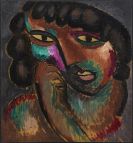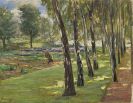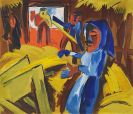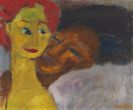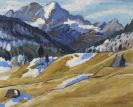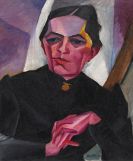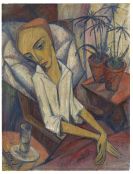
Bruno Krauskopf
Marienburg/Westpreußen
1892 -
Berlin
1960
Bruno Krauskopf was born on 9 March 1892 in the West Prussian town of Marienburg. He went to Berlin at the age of fourteen to begin an apprenticeship as a Chromo-lithographer. A grant enabled him to begin studying at the "Königliches Kunstgewerbemuseum" under Professor Doeppler in 1910.
Between 1913 and 1920, the graphic œuvre came into existence, which mainly consisted of lithographs, but to which woodcuts and linocuts were added. In 1916 Bruno Krauskopf joined the "Freie Berliner Sezession", but soon Lovis Corinth was able to persuade him to change to the "Berliner Sezession". In 1918 he was elected into the board and the jury where he remained until 1933 and exhibited works at the annual exhibitions. Krauskopf took part at the founding of the "Novembergruppe" and belonged - together with Max Pechstein, Rudolf Belling and Erich Mendelsohn - to its working committee.
Already at the beginning of the 1920s, Krauskopf's painting style changed: the colour palette became fresher and brighter, the pastous application of colour signified a stronger turning to Impressionism. One-man-shows at the galleries Flechtheim, Gurlitt and Victor Hartberg in Berlin followed. Numerous prizes give evidence of Krauskopf's increasing success. Trips to Poland and France between 1927 and 1932 inspired the artist's work, but his success came to an abrupt end when the Nazis came into power. When he refused to adapt to the official style his art was declared "degenerate".
The political pressure soon became too much and Bruno Krauskopf emigrated to Norway in 1933 where he settled in Stavanger. Here he was surrounded by a landscape, which suited his inclinations concerning light, colour and tectonics perfectly. This peaceful life in which he could concentrate on his work did not last for long, however, as Norway was occupied and he had to leave once again. He went to America where it took him a while to become accepted. Two New York galleries introduced Krauskopf to the art world in the US and in 1952 he was already celebrated as a contemporary American artist at the Carnegie International Exhibition in Pittsburgh.
In 1957 Bruno Krauskopf moved back to Berlin where he died three years later on 23 December 1960 after a severe illness. Krauskopf always considered himself a painter "who can only paint and nothing else" a dedication and passion which is evident in his work.
Would you like to sell a work by Bruno Krauskopf?
Infos for seller
